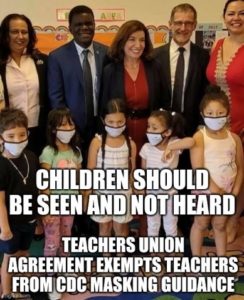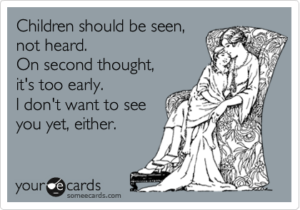Did you see a parent telling their kids 'children should be seen and not heard?' This post unpacks the meaning and origin of this expression.
Meaning
The expression 'children should be seen and not heard' means children should be respectful and behave around adults. It also means that children should only speak when an adult asks them a question. It's a way of describing proper behavior in children in strict households.
In the early 1900s and late 1800s, society had different views on children's behavior. If children became unruly, they were disciplined by their parents. Therefore, the phrase' children should be seen and not heard' became a way of telling kids to be quiet around adults and not make a noise or act unruly.
Example Usage
“I always thought children should be seen, not heard. However, it’s clear that your parenting skills lack the discipline your kids need in life.”
“Why do parents tell their kids that; 'children should be seen and not heard?’ Don’t they value the joy kids bring to the family? I just don’t get it.”
“There was a time when ‘children should be seen and not heard.’ However, from the looks of it, you sure don’t enforce that rule around your house.”
“These kids are crazy. They all have too much sugar in them, and they are impossible to handle. I remember the old saying, ‘children should be seen and not heard.’ Man, that applies right now.”


Origin
The expression ‘children should be seen and not heard’ originates from a parenting proverb from the 15th century. In these days, children had much stricter parents, and society had stringent values on how children should behave in public. An unruly child showed poor parenting, making for an embarrassing situation for the parents in public when children acted unruly.
The first use of the expression appears in ‘The 15th century Collection of Homilies,’ written by John Mirk, an Augustinian clergyman, in Mirk's Festial, circa 1450. The phrase is written in archaic English and appears as follows.
‘Hyt ys old Englysch sawe: A mayde schuld be seen, but not herd.’
Phrases Similar to Children should be Seen and not Heard
- Calm down.
- Be quiet.
Phrases Opposite to Children should be Seen and not Heard
- Kids can do whatever they want.
What is the Correct Saying?
- Children should be seen and not heard.
Ways People May Say Children should be Seen and not Heard Incorrectly
Some people may think that the phrase ‘children should be seen and not heard’ is a form of child abuse, preventing the child from expressing themselves. It’s an outdated concept in parenting, and most new-generation parents don’t think this rule applies to raising their children.
Acceptable Ways to Phrase Children should be Seen and not Heard
You can use the phrase ‘children should be seen and not heard’ when you’re addressing your kids for acting unruly. If the children are shouting and acting erratically, you can use the line to let them know they need to calm down and behave themselves.
The saying ‘children should be seen and not heard’ is archaic language used in parenting in the early 1900s. Children were supposed to act properly around the company of adults and not speak unless spoken to. However, changes in parenting over the last century mean that parents rarely discipline their children for being unruly.